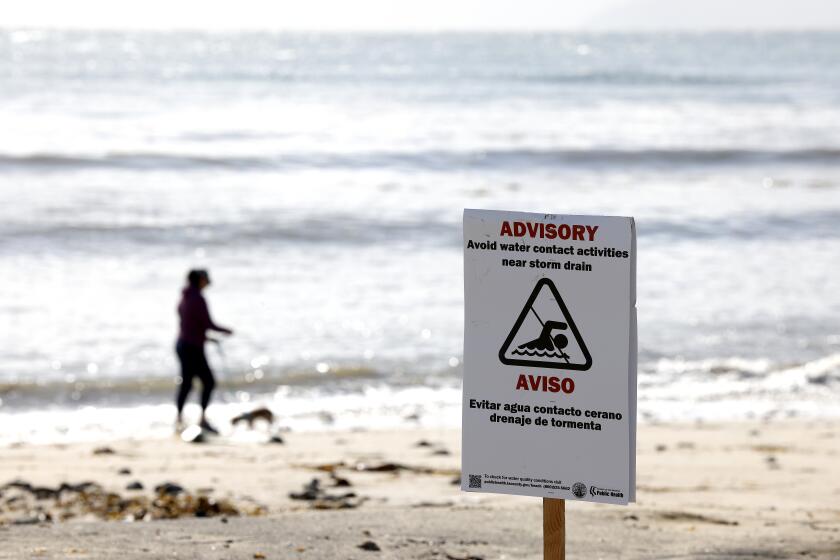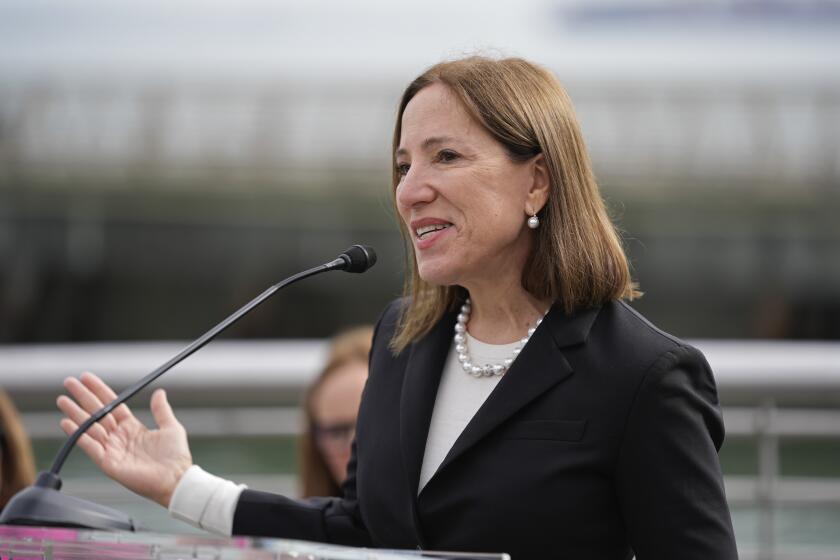Many O.C. Recipients Regard Reforms as Painful, Necessary
Mae Wells, 46, of Tustin arrived at the Grand Avenue welfare office Thursday to apply for food stamps just to tide her over while she’s unemployed and taking computer classes.
Reliance on government aid, however, runs deep in her family: three of her sisters receive federal Supplemental Security Income and her adult daughter for over a year has received Aid to Families with Dependent Children for her two children.
One day after President Clinton said he would approve legislation to overhaul welfare, she had this to say: “If the president signs this bill, my daughter’s probably one of the people who’s gonna get thrown off. And you know what? That’s fine by me. They need to kick my sisters off too, because not one of them is retarded. It pisses me off that I’m out here scraping and trying.”
And if the state, with new freedom from the federal government to design its own program, ultimately denies Wells food stamps?
“I’ll still get by,” she said.
Many of those gathered at the office had similar views: Welfare reform may be painful, but it’s necessary.
The overwhelming majority of Orange County’s 114,000 welfare recipients do “scrape and try” to get by, resorting to welfare usually for no more than two years, county officials said.
“We have people who go on welfare for a few weeks, to help them get back on their feet and people who stay on for a few months,” said Angelo Doti, director of financial assistance for the Social Services Agency. “Everyone keeps talking about welfare for life, but that’s not what we have here.”
But that is not to say that some welfare recipients are not worried about the reforms, including the two-year time limit on welfare California plans to impose on most people once the welfare bill takes effect.
“Just think if you can’t get a job or you can’t get child care,” said Tina Williams, 40, of Irvine. Williams, accompanied by her 6-year-old daughter, said she was seeking welfare because her unemployment payments had expired. “I really didn’t want to come here, but I prayed over it and finally decided it was what I had to do.”
A visit to the welfare office on Thursday, the first of the month when checks are distributed, showed other people similarly reluctant to seek public assistance. All of the people interviewed knew that reforms were imminent; some were familiar with the details, others were not.
The bill, which the Senate passed Thursday, would end the 61-year guarantee of cash assistance to every poor family. Instead, the federal government would give states broad guidelines to follow in designing their own programs. States will have a year to implement new programs or risk losing federal aid.
Under the federal bill, public assistance would be limited to five years in a lifetime, with states allowed to exempt 20% of their caseloads. The bill also would eliminate eligibility for Supplemental Security Income, food stamps and most other federal benefits for most legal immigrants and give states the option of banning legal immigrants from Medicaid.
Inside the three-building Grand Street complex is controlled frustration. Children are bored, tired and crying. Parents are exasperated as hour after hour slides by without apparent progress on their applications. At intervals, social services workers make announcements in English, Spanish and Vietnamese.
While cuddling her 1-month-old baby girl as she waited to complete Medi-Cal paperwork. Chana Tippie, 19, debated the welfare reform bill with her mother, Lorraine Enright, 39. “Welfare is a trap,” said Enright, who was there to accompany her daughter and grandchild. “It makes it easy for people not to do anything for themselves.”
Enright said she knows from experience.
Although college-educated and well-spoken, once, years ago, Enright and her husband turned to welfare for five months. “We resented it, we were embarrassed by it and we got off as soon as we could,” said Enright, now employed. “People should be willing to do the best they can to support themselves.”
Tippie, who is married, said she does not see her family on welfare for a long time so the new time limits on aid won’t affect her. “My husband will find a job soon, so then we won’t need it,” she said. “But there are going to be some people who fall through the cracks.”
Just how many people will need help--and not get it--worries advocates for the poor.
“Not that people are interested in perpetuating reliance on the government, but the concern is the children,” said Jean Wegener, executive director of Serving People in Need, a Newport Beach-based nonprofit group. “What happens to these children? If they’re hungry who’s going to feed them?
At FISH of the Harbor, a nonprofit organization that provides emergency rental, utility and cash assistance to poor people, Executive Director Debbie O’Connor said she worried that legal immigrants would suffer disproportionately. About 60% of her clients are immigrants, O’Connor said, and most are in the country legally. “They’ve been working here in the county for 10 or 15 years and now they’re going to be denied services when they’ve been paying taxes this whole time. It just doesn’t seem right.”
The move to strike legal immigrants who do not become citizens from most federal assistance programs largely was fueled by the skyrocketing number of elderly immigrants who come to the U.S. to reunite with their families and then apply for welfare. Advocates of ending such aid argued that behavior exemplifies the kind of exploitation of welfare they seek to end.
Not worried at all was Christina Rubalcaba, 18, who had accompanied her mother to the Grand Street office to serve as a translator. Her mother, Paula, came to the U.S. from Jalisco, Mexico, in 1976 but is not a citizen and is not eligible for welfare. Her four sons, however, were born in the U.S. and receive AFDC.
Even while describing her own family’s hardships, Rubalcaba expressed disgust for any lack of self-sufficiency. In particular, Rubalcaba, who is Latina, accused many immigrants of abusing welfare.
“A lot of immigrants just come here to have their babies, but there’s a way how to have babies. They need some family planning,” she said. “They could learn English. They could go to school and learn, but they don’t want to work.”
After speaking, she turned to translate her words for her mother, who nodded in agreement. Although she has taken some English classes, Paula said, it was too difficult for her to learn. Finding a job without it has been impossible.
“And we don’t have any money,” said Paula Rubalcaba in Spanish. “My husband only makes $800 a month and the rent alone is $900. With food and clothes and other expenses, you can’t live on that.”
The family, however, should not have to rely on welfare for more than a year, Christina said. “For this year we need it, but my brothers are getting older and they’ll be able to go to work next year. After that we’ll be fine.”
More to Read
Start your day right
Sign up for Essential California for news, features and recommendations from the L.A. Times and beyond in your inbox six days a week.
You may occasionally receive promotional content from the Los Angeles Times.






